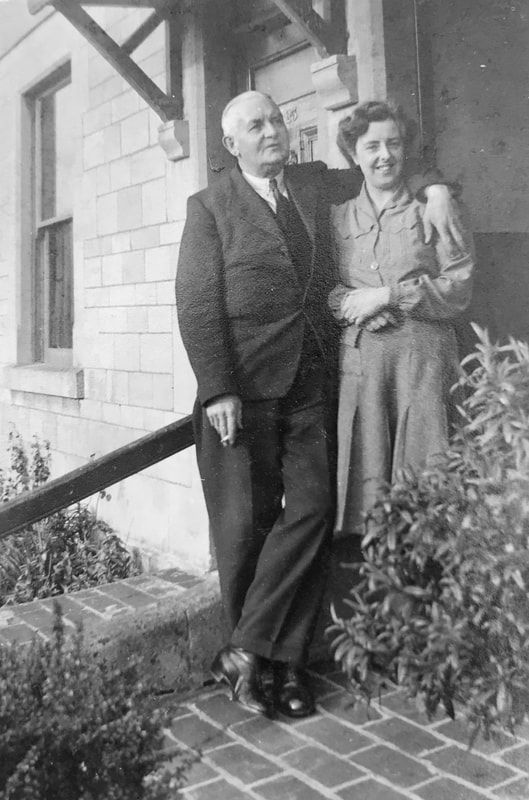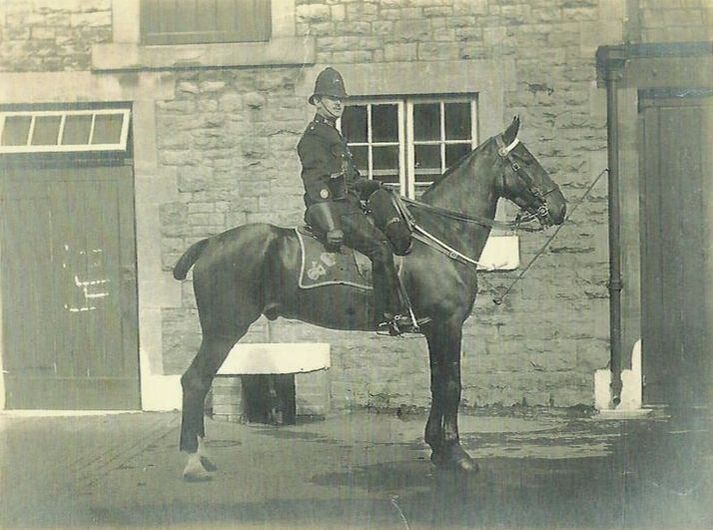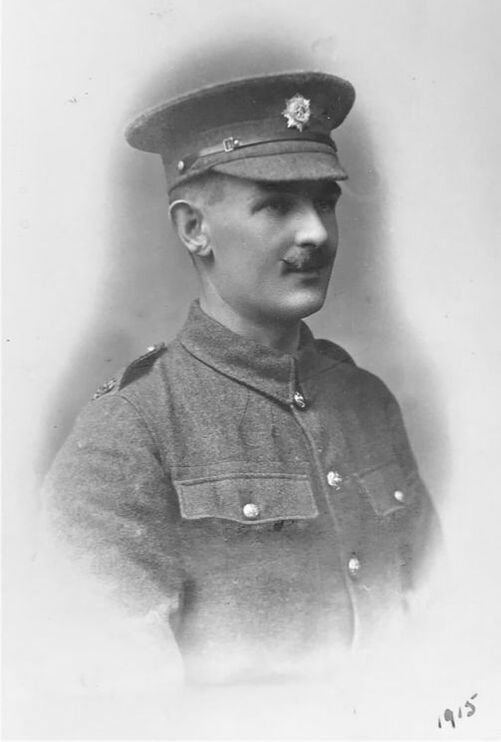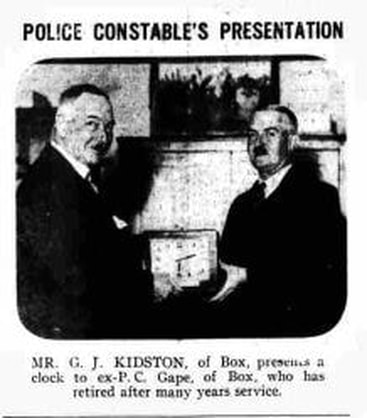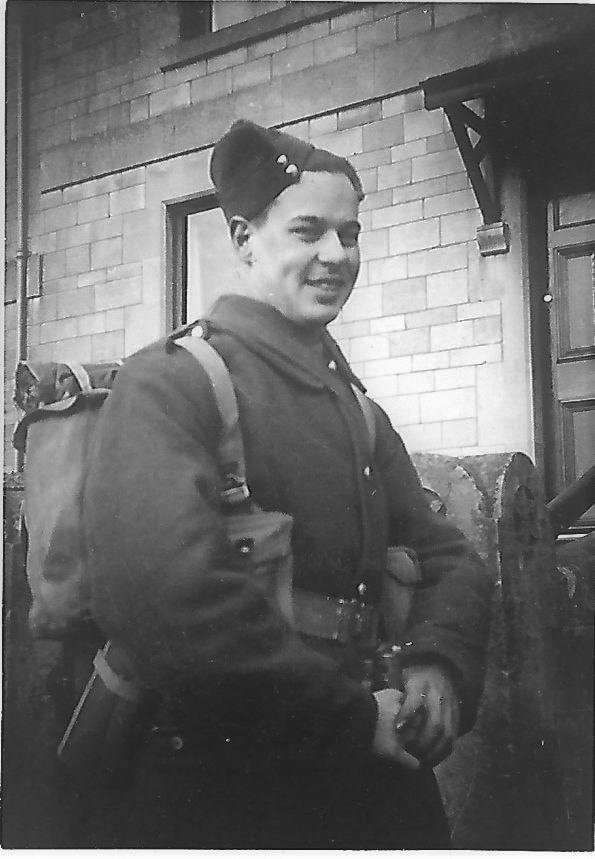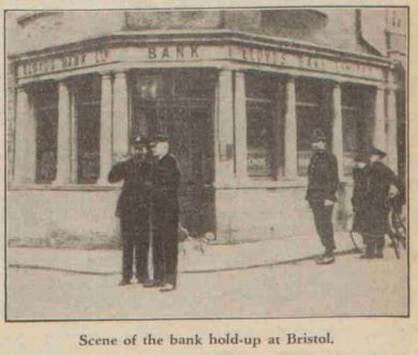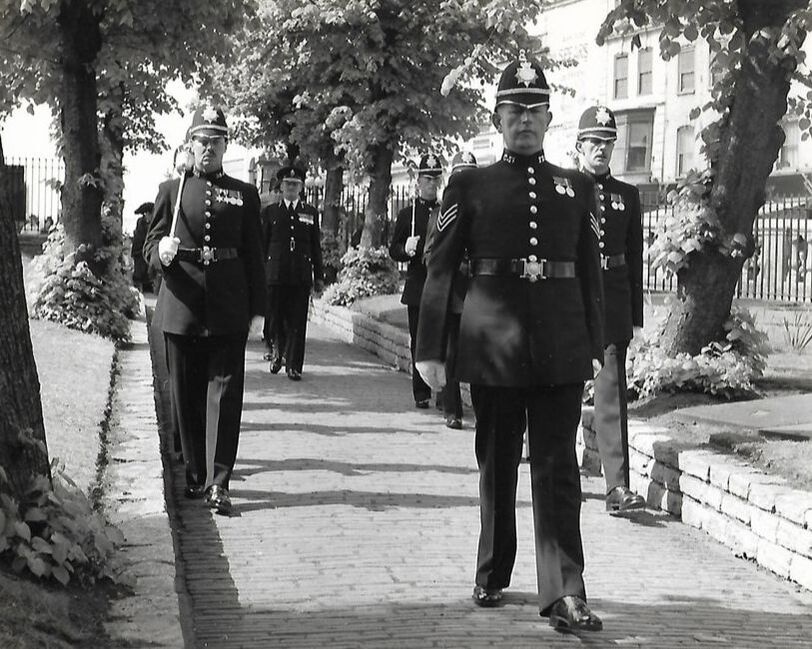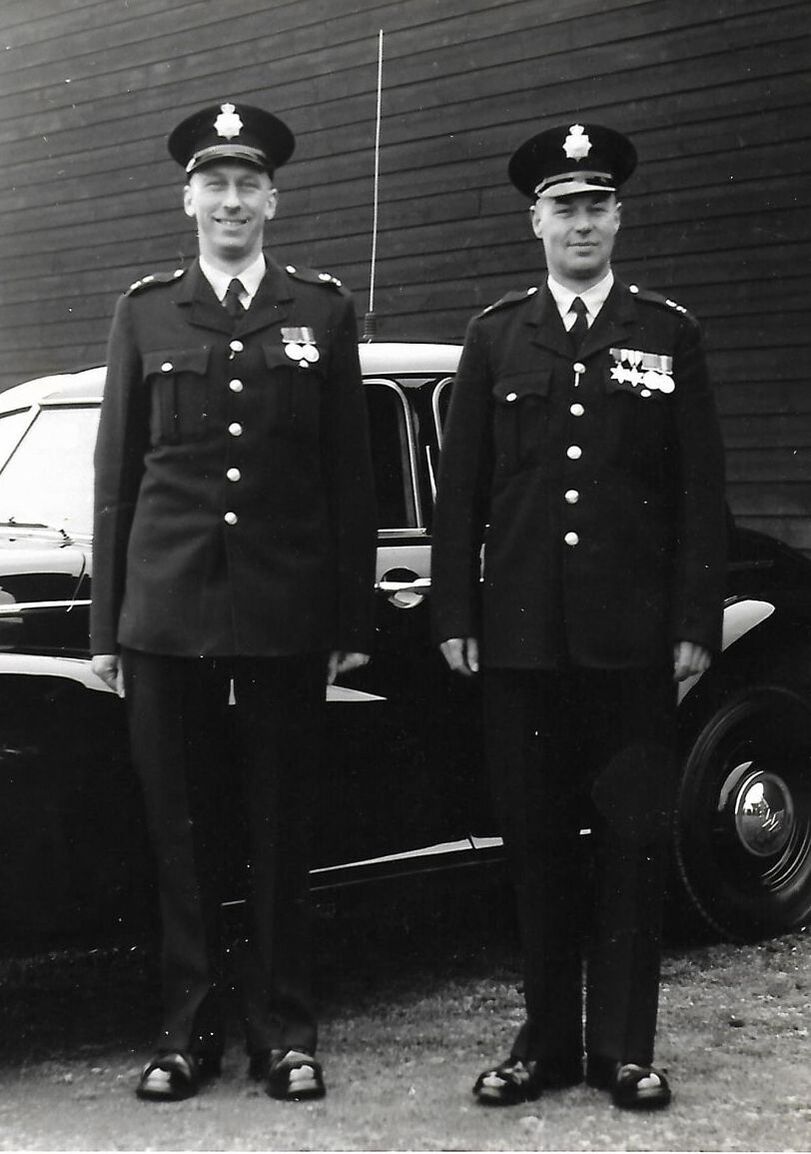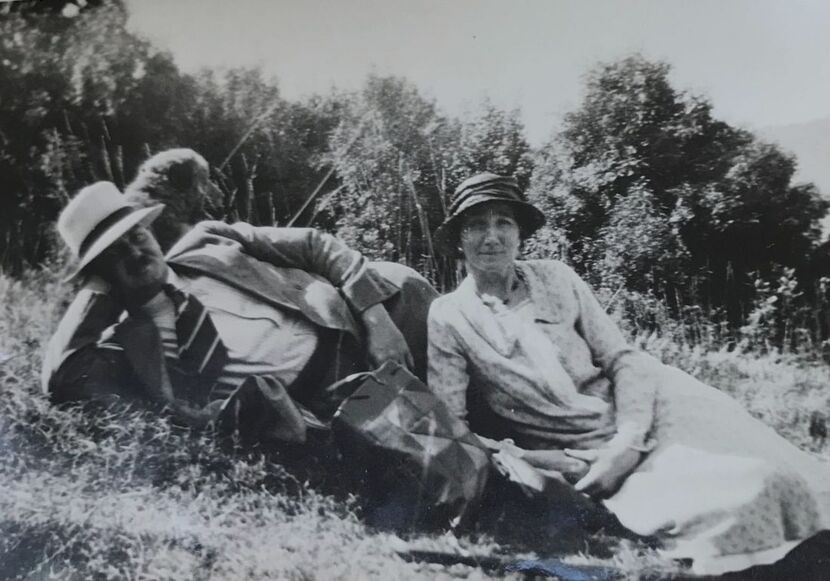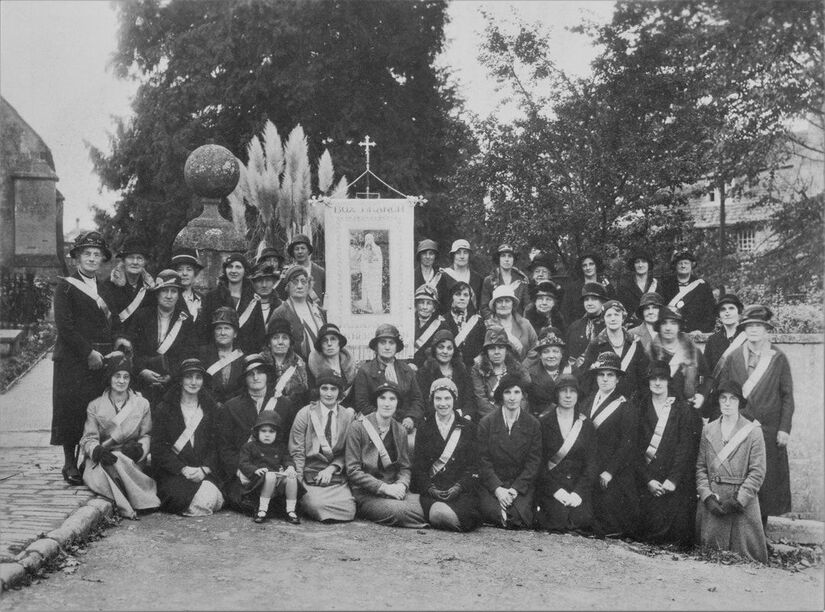|
Joseph Gape, PC
Text and photos Mike Gape August 2021 John Joseph Robert Gape, known to me as Grampy Joe, was my grandfather. I remember him with affection, although as a young child he could appear rather strict. This of course may be a reflection of our behaviour! In Box he was the village bobby, known and respected by all as a pillar of society in the decade before the Second World War. Joseph was not a native of Box, being born at Plumstead Road, Salhouse, St Faith’s in Norfolk in October 1889. He was the son of John Gape (1863-), an engine driver, and Elizabeth Stringer (1864-) from Lowestoft. In 1891 the family were living at Salhouse, a gravel extraction area which became important with improvements to road surfaces in the early twentieth century. In that respect, Salhouse was not dissimilar to Box but it was a more restricted environment as the area was controlled by a Poor Law Institution (St Faith’s). My great grandfather John was probably a tenant of a Poor Law house but not an employee or inmate. Possibly he drove a stationary steam engine for a brick kiln project at Plumstead. They were still recorded as living there in 1897 but at that point they moved to Marylebone, London, where a younger child was born. Joseph & daughter-in-law Joyce Browning outside 24 Fairmead View, 1944 |
Joseph’s Early Career
Joseph went to live with his uncle Henry Joseph Barstead of East Tytherton who was a blacksmith in Chippenham and Joe later worked as a groom at various places in the area, including for Major WL Lysley at Rowden Hill. In April 1910 he joined the Wiltshire Constabulary. He started his training as a police constable in Swindon, where he was working in 1911 and became a Mounted Police Officer, the last one to serve in the Wiltshire Force. Part of his beat on horseback was Savernake Forest.
Joseph went to live with his uncle Henry Joseph Barstead of East Tytherton who was a blacksmith in Chippenham and Joe later worked as a groom at various places in the area, including for Major WL Lysley at Rowden Hill. In April 1910 he joined the Wiltshire Constabulary. He started his training as a police constable in Swindon, where he was working in 1911 and became a Mounted Police Officer, the last one to serve in the Wiltshire Force. Part of his beat on horseback was Savernake Forest.
Two years later, he married Winifred Blanche Stevens (8 July 1887-) on 18 August 1913 at Henbury, Bristol. In the same year they moved to Etchilhampton near Devizes where he became chauffeur to the Chief Constable Lieutenant Colonel Sir Hoel Llewellyn, DSO, who later served for 37 years as Wiltshire’s third Chief Constable.
|
Joseph’s career was interrupted by the outbreak of the Great War and in 1915 he took leave from the police force to join the army. He served as a driver with 286 Company Army Service Corps (Motor Transport Section) in France attaining the heights of Lance Corporal. On demobilization at the end of the war he returned to continue his service with Wiltshire Police Force, not as a chauffeur but as a bobby on the beat and was stationed at Mildenhall near Marlborough.
At the end of the war, food was in short supply and self-sufficiency was encouraged. The Chief Constable allowed Police Constables who were stationed in rural areas to keep pigs and poultry. This Joe did to supplement the family food supply until about 1924 when he was moved from Mildenhall to Broughton Gifford near Melksham. By this time Winifred and Joe had three sons, Mervyn (my father), Wilfred and Robert. Joseph worked in a number of different locations before he came to Box. In 1929 he was serving in Melksham and a local newspaper reported that he arrested a man loitering for the purpose of receiving bets.[1] The Street Betting Act of 1906 had prohibited public betting on the highway but bookmakers employed fast-moving runners to evade the law. Obviously, it didn’t work in this case as Joseph was too fast for him to escape. Joseph in the Army Service Corps in 1915 |
Joseph was obviously a most efficient officer. In a single week in 1929, he prosecuted three separate cases of highway offences in Melksham.[2] One was against a lady from Shurnhold who was driving without a rear red light and without numberplate illumination; another was for the driver of a motorcycle which was too loud; and the third was a motorcycle without a working silencer. He wasn’t the only officer to have several motor vehicle cases but there was a particular reason why Joseph was so diligent about these offenses.
Personal Tragedy, 1928
Joseph’s preoccupation with motor offenses wasn’t just out of pettiness. In 1928, his four-year-old son Robert Frederick was killed in tragic circumstances in Broughton Gifford.[3] A 22-year-old motor car proprietor was driving a Daimler car to take passengers to the railway station. After collecting one person, he was driving in third gear around a corner when Robert ran out in front of him. On being taken to his father’s house, young Robert was pronounced dead. In evidence, the driver said he had been a qualified driver for four years and had been using the Daimler for the last three. A witness was called who verified the driver’s version of events and the jury held that the death was accidental.
Robert was buried in Broughton Gifford Churchyard. At the funeral, the pathway to the church was lined with Robert’s schoolfellows and teachers and six little boys wearing white ties acted as bearers. The funeral was attended by members of the Trowbridge and Bradford Police Division as well as local villagers. There is no wonder that Joseph sought to enforce road traffic safety at every opportunity to avoid future accidents.
Joseph’s preoccupation with motor offenses wasn’t just out of pettiness. In 1928, his four-year-old son Robert Frederick was killed in tragic circumstances in Broughton Gifford.[3] A 22-year-old motor car proprietor was driving a Daimler car to take passengers to the railway station. After collecting one person, he was driving in third gear around a corner when Robert ran out in front of him. On being taken to his father’s house, young Robert was pronounced dead. In evidence, the driver said he had been a qualified driver for four years and had been using the Daimler for the last three. A witness was called who verified the driver’s version of events and the jury held that the death was accidental.
Robert was buried in Broughton Gifford Churchyard. At the funeral, the pathway to the church was lined with Robert’s schoolfellows and teachers and six little boys wearing white ties acted as bearers. The funeral was attended by members of the Trowbridge and Bradford Police Division as well as local villagers. There is no wonder that Joseph sought to enforce road traffic safety at every opportunity to avoid future accidents.
On Duty in Box
Joe remained in Broughton Gifford until 1931 when he was transferred to Box where he and his family lived at 24 Fairmead View, which was owned by Wiltshire Police Force and operated as the local police station. Joseph served as a police constable in Box from 1931 to 1937. He took over from long-service village policeman PC Teddy Carter who had transferred to Broughton Gifford in Joseph’s place. The sort of issues that Joseph had to deal with in Box were frequently breeches of regulations involving cycling, motorcycling and motor cars. The government had decided that the rules should be rigorously enforced because there had been a dramatic growth in road deaths to 7,000 a year in the late 1920s, despite the volume of traffic being only 2.3 million vehicles. The Ministry of Transport introduced the Highway Code in 1931 setting out regulations about lights, the interaction with horse-drawn traffic and the sounding of the car horn when overtaking.[4] These rules seem rather archaic to modern drivers but they were a huge advance on previously unregulated drivers at a time before even driving tests were compulsory (introduced in 1935).
The new rules led to many breeches of the law with cases in Box involving riding a motorcycle without tax and insurance, overtaking without due care, obstructing the highway and use of excessive speed (40 miles per hour) on the Devizes Road opposite Wormwood Farm.[5] More unusual motoring cases that Joseph dealt with involved a slightly tired cyclist who hitched a lift down Box Hill in 1932 by hanging onto the back of a lorry.[6] In 1934 the driver of a Bath Tramways Company bus was knocked unconscious trying to put out a fire in the engine of a passing car, after which PC Gape administered first aid to resuscitate the man.[7] And in 1934 a motorist misunderstood (or ignored) PC Gape’s hand-signal to stop at the Box Post Office crossroads.[8]
Of course, there were other breeches of the law and often incidents of petty pilferage, partly exacerbated by unemployment and poverty in the 1930s. Seven well-known Box Hill residents (Kate and Frank Barnett, Richard Slatford, Edwin and John Dancey, Isaac Greenman and Frederick Walker) were charged with stealing wood from a collapsed stable in 1932.[9] They wanted it as firewood for heating purposes. More surprising was the case of a battery theft from a parked car, which Joseph solved by tracing the owner and finding the battery hidden in a shed.[10]
Joe remained in Broughton Gifford until 1931 when he was transferred to Box where he and his family lived at 24 Fairmead View, which was owned by Wiltshire Police Force and operated as the local police station. Joseph served as a police constable in Box from 1931 to 1937. He took over from long-service village policeman PC Teddy Carter who had transferred to Broughton Gifford in Joseph’s place. The sort of issues that Joseph had to deal with in Box were frequently breeches of regulations involving cycling, motorcycling and motor cars. The government had decided that the rules should be rigorously enforced because there had been a dramatic growth in road deaths to 7,000 a year in the late 1920s, despite the volume of traffic being only 2.3 million vehicles. The Ministry of Transport introduced the Highway Code in 1931 setting out regulations about lights, the interaction with horse-drawn traffic and the sounding of the car horn when overtaking.[4] These rules seem rather archaic to modern drivers but they were a huge advance on previously unregulated drivers at a time before even driving tests were compulsory (introduced in 1935).
The new rules led to many breeches of the law with cases in Box involving riding a motorcycle without tax and insurance, overtaking without due care, obstructing the highway and use of excessive speed (40 miles per hour) on the Devizes Road opposite Wormwood Farm.[5] More unusual motoring cases that Joseph dealt with involved a slightly tired cyclist who hitched a lift down Box Hill in 1932 by hanging onto the back of a lorry.[6] In 1934 the driver of a Bath Tramways Company bus was knocked unconscious trying to put out a fire in the engine of a passing car, after which PC Gape administered first aid to resuscitate the man.[7] And in 1934 a motorist misunderstood (or ignored) PC Gape’s hand-signal to stop at the Box Post Office crossroads.[8]
Of course, there were other breeches of the law and often incidents of petty pilferage, partly exacerbated by unemployment and poverty in the 1930s. Seven well-known Box Hill residents (Kate and Frank Barnett, Richard Slatford, Edwin and John Dancey, Isaac Greenman and Frederick Walker) were charged with stealing wood from a collapsed stable in 1932.[9] They wanted it as firewood for heating purposes. More surprising was the case of a battery theft from a parked car, which Joseph solved by tracing the owner and finding the battery hidden in a shed.[10]
|
Joe’s Later Life
Joseph had joined the Wiltshire Constabulary in 1910 and he retired after 25 years of commissioned service at the end of October in 1936. His retirement was seen as a decisive change in the village.[11] As a mark of their appreciation, residents subscribed to a fund to buy him a clock with Westminster chimes and George Jardine Kidston, High Sheriff of Wiltshire, made the presentation at a packed Box School. Dr JP Martin, chairman of Box Parish Council, expressed his thanks for Joe’s quiet efficiency and the great regret that residents had on hearing about his retirement. During the Second World War, he was a War Department Security Clerk, still living at 24 Fairmead View, which he originally occupied as a grace and favour tenancy as it was the police station until the station moved to a shed in the garden of The Keep, London Road. After his retirement Joe bought the Fairmead View house. |
Joe continued working after retiring from the police. From 1936 to 1947 he worked as security clerk at the War Department ammunition dump in Corsham. From 1947 to 1949 he worked as a Stores clerk at the Westinghouse Brake and Signal Company, Chippenham. From then until 1955 he was a Telephone Orderly at the 23rd Army Families Hostel, Corsham. After this he retired completely but he and Winifred continued to live in Fairmead View until his death in August 1960. He was cremated at Arnos Vale Crematorium in Bristol.
|
My father Mervyn Gape, PC When he left school Mervyn started an engineering apprenticeship with Stothert and Pitt, crane builders in Bath. I think he must have got bored with this and he fell for the charms of the Grenadier Guard’s recruiting sergeant and signed up for Army service in October 1936. When war was declared, he was sent to France. The Grenadiers played an important role in defending the beachhead against the German blitzkrieg assault and were at the thick of some of the worst fighting. Together with thousands of others, he was later evacuated through Dunkirk in June 1940 during the withdrawal of the British Expeditionary Force. The Grenadiers then undertook work in Britain to prepare the country's defences against possible German invasion. During this period, Mervyn was promoted to rank of Sergeant. He returned to France in the Allied invasion of Normandy in 1944. The photograph left shows a twenty-four-year-old Mervyn outside of 24 Fairmead Villas prior to embarkation to Normandy in June 1944, four years after Dunkirk. At the end of the war in Europe in September 1945, Mervyn was demobbed from the Grenadier Guards and returned to civilian life. |
He joined Bristol Constabulary shortly after and together with his wife Marion Joyce (known as Joyce) moved to Bristol where they settled and raised their family. I was born in 1946 followed by my sister Rachel Jean in 1949 and our brother Richard Steven in 1953.
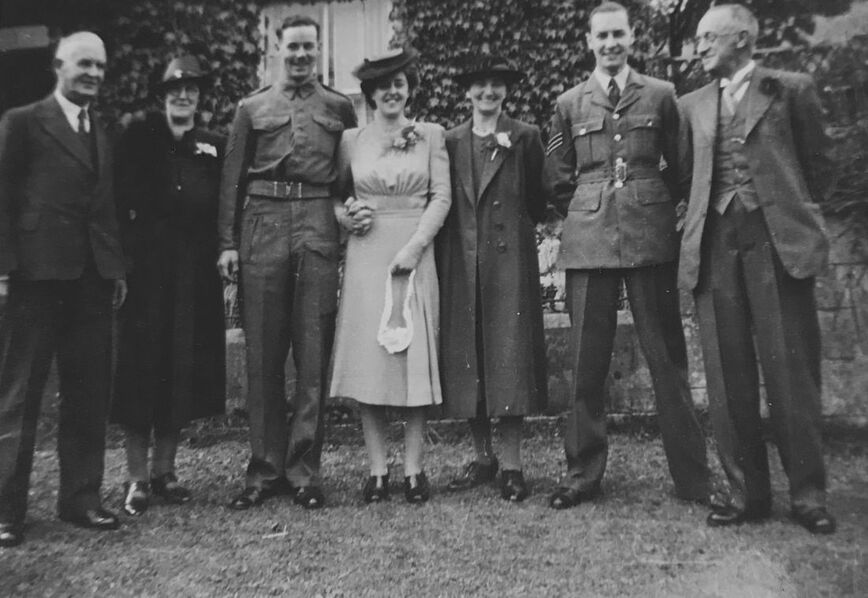
Family group at the wedding of Mervyn Gape and Joyce Browning, 15 September, 1943. From left to right: Joseph Gape, Lillian May Browning (nee Richards), Mervyn Joseph Gape, Marion Joyce Browning, Winifred Blanche Gape, Wilfred Stevens Gape, and James White Browning. The photo was taken at Thornwood, home of Marion Joyce’ parents Lillian and James Browning
In 1950 Mervyn was involved in a notorious murder case when he apprehended two Polish men, Roman Redel and Zbigniew Gower, accused of a bank robbery.[12] After robbing the bank the men were chased down the street by passers-by. A gun was pulled out by Redel and an innocent pursuer, Robert George Taylor, was shot dead.
|
Mervyn was on motor patrol and received a wireless message directing him to the crime. He apprehended the two men and a later search revealed cash and cheques and a gun with a spent cartridge in Redel’s pocket. The case became famous and was reported nationally when both men were sentenced to be hanged.
The jury recommended mercy for Gower but the appeal was turned down and the Home Secretary refused to recommend a reprieve. They were both hanged on 7 July 1950.[13] This was still a decade before capital punishment was abolished and the law was specific in cases of crimes involving a shooting. Whatever thoughts people had about this punishment, I am sure that Joseph was very proud of the work done by his son Mervyn to apprehend the men. |
Uncle Wilfred Gape
Wilfred Stevens Gape was Mervyn’s younger brother. On leaving school, Wilf successfully applied to join the RAF as an apprentice. He trained at RAF Halton where the apprentices were known as Halton Brats. When war broke out, he saw action in Malta where he was injured, suffering severe burns during one of the many raids on the island. He was evacuated back to the UK via Egypt and Scotland. Following his recovery, he resumed active service and was able to meet up with Mervyn in Brussels during the Allied advance. That must have been a great reunion for the pair of them!
Wilf continued his service in the Airforce right through to the 1960s working on V-bombers after starting his career working on biplanes and piston engines. When he left the RAF, he found employment in the aerospace industry at Filton in Bristol. He was a production line inspector there, I believe.
Wilfred Stevens Gape was Mervyn’s younger brother. On leaving school, Wilf successfully applied to join the RAF as an apprentice. He trained at RAF Halton where the apprentices were known as Halton Brats. When war broke out, he saw action in Malta where he was injured, suffering severe burns during one of the many raids on the island. He was evacuated back to the UK via Egypt and Scotland. Following his recovery, he resumed active service and was able to meet up with Mervyn in Brussels during the Allied advance. That must have been a great reunion for the pair of them!
Wilf continued his service in the Airforce right through to the 1960s working on V-bombers after starting his career working on biplanes and piston engines. When he left the RAF, he found employment in the aerospace industry at Filton in Bristol. He was a production line inspector there, I believe.
My Reminiscences of Box
Whilst writing this article, I remember with great fondness, staying with my grandparents during school holidays. Together with my brother and sister we always enjoyed our trips to Box to visit family members. My mother was Joyce Browning who was born at Thornwood, Devizes Road and our maternal grandparents still lived there at this time. She was brought up in Box Mill with her brother Walter and their parents, James and Lillian Browning, who owned the Mill.
I can remember going for walks as a small boy, with Joe to Mr Fudge’s paper shop, next to the Post Office, with its magnificent wooden counter. Joe would buy his supply of St. Bruno pipe tobacco and a newspaper. After walking his little Papillon dog called Mandy we would return to Fairmead View. Joe would then cut up some of the solid block of tobacco and rub the slices between his palms and fill his tobacco pouch. The remainder would go into an airtight jar for storage. Milk was delivered in the centre of the village by Mr Clem Dyke from the Old Dairy in the Market Place. My grandmother would put out a milk jug or two and Mr Dyke would call, wearing a cap and faded brown long heavy cotton work coat. The milk was carried in large cans over his shoulders and he would very deftly ladle the milk into the jugs - no glass bottles used in those days! He did his milk round on a small horse-drawn cart. I remember helping my grandmother with her shopping. We would occasionally call in to see Mr Schofield whose shop (now called Frogmore Cottage) in the Market Place sold electrical items and ironmongery. Then cross the road to the Hill’s butcher’s shop. My grandmother always baked her own bread so she usually paid a visit to the baker’s shop for a few ounces of fresh yeast.
I remember being unable to get to sleep for several nights running on one stay at Fairmead View because the RAF were practicing night flying from their base at Colerne. They were flying Handley Page Hastings transport aircraft around and round performing circuits and bumps! On one stay I was treated to a coach trip to Lyme Regis courtesy of Miller’s Coaches. I often went mackerel fishing with Joe and my grandmother baked (or soused) the fish for dinner the following day. Delicious!
As a small boy I was never without a lump of Plasticine. Sadly, there was a fire in Harbutt’s Plasticine factory in Bathampton. Fire damaged items were dumped in a landfill site between The Rec and the railway line. My observant grandfather spotted packs of undamaged Plasticine when out walking his dog and salvaged them for his very grateful grandchildren on their next visit. As I got older, I was able to roam around unaccompanied and explore Box Brook and the quarries.
Whilst writing this article, I remember with great fondness, staying with my grandparents during school holidays. Together with my brother and sister we always enjoyed our trips to Box to visit family members. My mother was Joyce Browning who was born at Thornwood, Devizes Road and our maternal grandparents still lived there at this time. She was brought up in Box Mill with her brother Walter and their parents, James and Lillian Browning, who owned the Mill.
I can remember going for walks as a small boy, with Joe to Mr Fudge’s paper shop, next to the Post Office, with its magnificent wooden counter. Joe would buy his supply of St. Bruno pipe tobacco and a newspaper. After walking his little Papillon dog called Mandy we would return to Fairmead View. Joe would then cut up some of the solid block of tobacco and rub the slices between his palms and fill his tobacco pouch. The remainder would go into an airtight jar for storage. Milk was delivered in the centre of the village by Mr Clem Dyke from the Old Dairy in the Market Place. My grandmother would put out a milk jug or two and Mr Dyke would call, wearing a cap and faded brown long heavy cotton work coat. The milk was carried in large cans over his shoulders and he would very deftly ladle the milk into the jugs - no glass bottles used in those days! He did his milk round on a small horse-drawn cart. I remember helping my grandmother with her shopping. We would occasionally call in to see Mr Schofield whose shop (now called Frogmore Cottage) in the Market Place sold electrical items and ironmongery. Then cross the road to the Hill’s butcher’s shop. My grandmother always baked her own bread so she usually paid a visit to the baker’s shop for a few ounces of fresh yeast.
I remember being unable to get to sleep for several nights running on one stay at Fairmead View because the RAF were practicing night flying from their base at Colerne. They were flying Handley Page Hastings transport aircraft around and round performing circuits and bumps! On one stay I was treated to a coach trip to Lyme Regis courtesy of Miller’s Coaches. I often went mackerel fishing with Joe and my grandmother baked (or soused) the fish for dinner the following day. Delicious!
As a small boy I was never without a lump of Plasticine. Sadly, there was a fire in Harbutt’s Plasticine factory in Bathampton. Fire damaged items were dumped in a landfill site between The Rec and the railway line. My observant grandfather spotted packs of undamaged Plasticine when out walking his dog and salvaged them for his very grateful grandchildren on their next visit. As I got older, I was able to roam around unaccompanied and explore Box Brook and the quarries.
Conclusion
Joseph quickly became very popular in Box. Local residents recalled how he would patrol village to ensure all was peaceful, accompanied by his Airedale terrier dog.[14] In his work, Joseph was a very efficient officer who carried out his duties quietly and in order; always a steady pair of hands. He represented the police and Box village at funerals, such as that of Lord Methuen in 1932, and acted as the coroner’s officer on the death of Frank Sawyer in 1933.[15]
In turn, Joseph and Winifred clearly felt they were happy in Box and they were able to buy the property at 24 Fairmead View when it was put up for sale. They settled into village life and were active in local events after Joseph’s retirement. In 1937 Joseph was appointed umpire of the Box Cricket Club Second Eleven, a suitable appointment for a man of integrity.[16] Both Joseph and Winifred were active in Box Church: Winifred part of the banner presentation of the Box Mothers’ Union in 1933 and Joseph appointed to the Church Council in 1937.[17] Joseph died at home in Fairmead View on 10 August 1960. Winifred continued to live in the house until she was unable to live independently and went to Filton, Bristol where she was cared for by her younger son Wilf and his wife Pauline until her death in 1974.
Joseph quickly became very popular in Box. Local residents recalled how he would patrol village to ensure all was peaceful, accompanied by his Airedale terrier dog.[14] In his work, Joseph was a very efficient officer who carried out his duties quietly and in order; always a steady pair of hands. He represented the police and Box village at funerals, such as that of Lord Methuen in 1932, and acted as the coroner’s officer on the death of Frank Sawyer in 1933.[15]
In turn, Joseph and Winifred clearly felt they were happy in Box and they were able to buy the property at 24 Fairmead View when it was put up for sale. They settled into village life and were active in local events after Joseph’s retirement. In 1937 Joseph was appointed umpire of the Box Cricket Club Second Eleven, a suitable appointment for a man of integrity.[16] Both Joseph and Winifred were active in Box Church: Winifred part of the banner presentation of the Box Mothers’ Union in 1933 and Joseph appointed to the Church Council in 1937.[17] Joseph died at home in Fairmead View on 10 August 1960. Winifred continued to live in the house until she was unable to live independently and went to Filton, Bristol where she was cared for by her younger son Wilf and his wife Pauline until her death in 1974.
Joseph had concluded his retirement speech in 1937 with his assessment of the requirements to be a policeman and that he had tried to carry out his duties impartially to all. That is a commendable attribute for police forces throughout the ages. Memories of the lovely village of Box and of my family members who lived there will always be with me.
Family Tree
John Gape (1863-) married Elizabeth Stringer (1864-1923). Children:
Joseph John Robert Gape (21 October 1889-1960) married Winifred Blanche Stevens (8 July 1887-16 January 1974) on 18 August 1913 at Henbury, Bristol. Children:
John Gape (1863-) married Elizabeth Stringer (1864-1923). Children:
- Joseph John Robert (born 1889 at Salhouse, Norfolk-1960);
- William Israel (1891-1961);
- Esther Elizabeth (1895-1924) who married Christopher H Neale in 1914
- George Henry (1898-1904)
- Edward (1901-).
Joseph John Robert Gape (21 October 1889-1960) married Winifred Blanche Stevens (8 July 1887-16 January 1974) on 18 August 1913 at Henbury, Bristol. Children:
- Mervyn Joseph Gape (14 January 1920-14 March 1997), Bristol police constable. In 1943 he married Marion Joyce Browning (30 June 1918-) a nurse at RUH in 1939. Children include: John Michael Gape (author of this article), Rachel Jean Gape and Richard Steven Gape;
- Wilfred Stevens (4 March 1922-1982);
- Robert Frederick (born 1924 at Bradford-on-Avon-1928).
References
[1] The Wiltshire Times, 7 May 1927
[2] The Wiltshire Times, 12 October 1929
[3] The Wiltshire Times, 1 September 1928
[4] History of road safety, The Highway Code and the driving test - GOV.UK (www.gov.uk)
[5] Bath Weekly Chronicle and Herald, 17 June 1933, 8 July 1933, 23 September 1933 and 21 April 1934
[6] Bath Chronicle and Herald, 18 June 1932
[7] Bath Weekly Chronicle and Herald, 5 May 1934
[8] Bath Weekly Chronicle and Herald, 16 June 1934
[9] Bath Chronicle and Herald, 22 October 1932
[10] Bath Weekly Chronicle and Herald, 5 September 1936
[11] The Wiltshire Times, 2 January 1937
[12] Western Daily Press, 6 April 1950
[13] The Daily Mirror, 8 July 1950
[14] Courtesy Geoff Bence
[15] Bath Chronicle and Herald, 5 November 1932 and 14 January 1933
[16] Wiltshire Times and Trowbridge Advertiser, 20 March 1937
[17] Wiltshire Times and Trowbridge Advertiser, 10 April 1937
[1] The Wiltshire Times, 7 May 1927
[2] The Wiltshire Times, 12 October 1929
[3] The Wiltshire Times, 1 September 1928
[4] History of road safety, The Highway Code and the driving test - GOV.UK (www.gov.uk)
[5] Bath Weekly Chronicle and Herald, 17 June 1933, 8 July 1933, 23 September 1933 and 21 April 1934
[6] Bath Chronicle and Herald, 18 June 1932
[7] Bath Weekly Chronicle and Herald, 5 May 1934
[8] Bath Weekly Chronicle and Herald, 16 June 1934
[9] Bath Chronicle and Herald, 22 October 1932
[10] Bath Weekly Chronicle and Herald, 5 September 1936
[11] The Wiltshire Times, 2 January 1937
[12] Western Daily Press, 6 April 1950
[13] The Daily Mirror, 8 July 1950
[14] Courtesy Geoff Bence
[15] Bath Chronicle and Herald, 5 November 1932 and 14 January 1933
[16] Wiltshire Times and Trowbridge Advertiser, 20 March 1937
[17] Wiltshire Times and Trowbridge Advertiser, 10 April 1937
